Healthcare Management: Marketing, FMFIA Compliance & EHR Application
VerifiedAdded on 2023/05/29
|5
|878
|110
Discussion Board Post
AI Summary
This assignment delves into various aspects of healthcare management, starting with a discussion on personal marketing communications, highlighting Cardinal Health, Inc.'s patient-centered approach, and the role of marketing in healthcare. It then examines the Federal Managers Financial Integrity Act of 1982 and its impact on financial management responsibilities for healthcare facility managers, emphasizing compliance, financial reporting, and fraud prevention. Furthermore, the assignment explores the role of Electronic Health Records (EHRs) and other health information systems in improving treatment outcomes, risk stratification, patient engagement, care coordination, and telehealth, ultimately aiming to enhance healthcare quality, accessibility, and cost-effectiveness. The importance of data analytics in predicting and improving healthcare performance is also underscored.
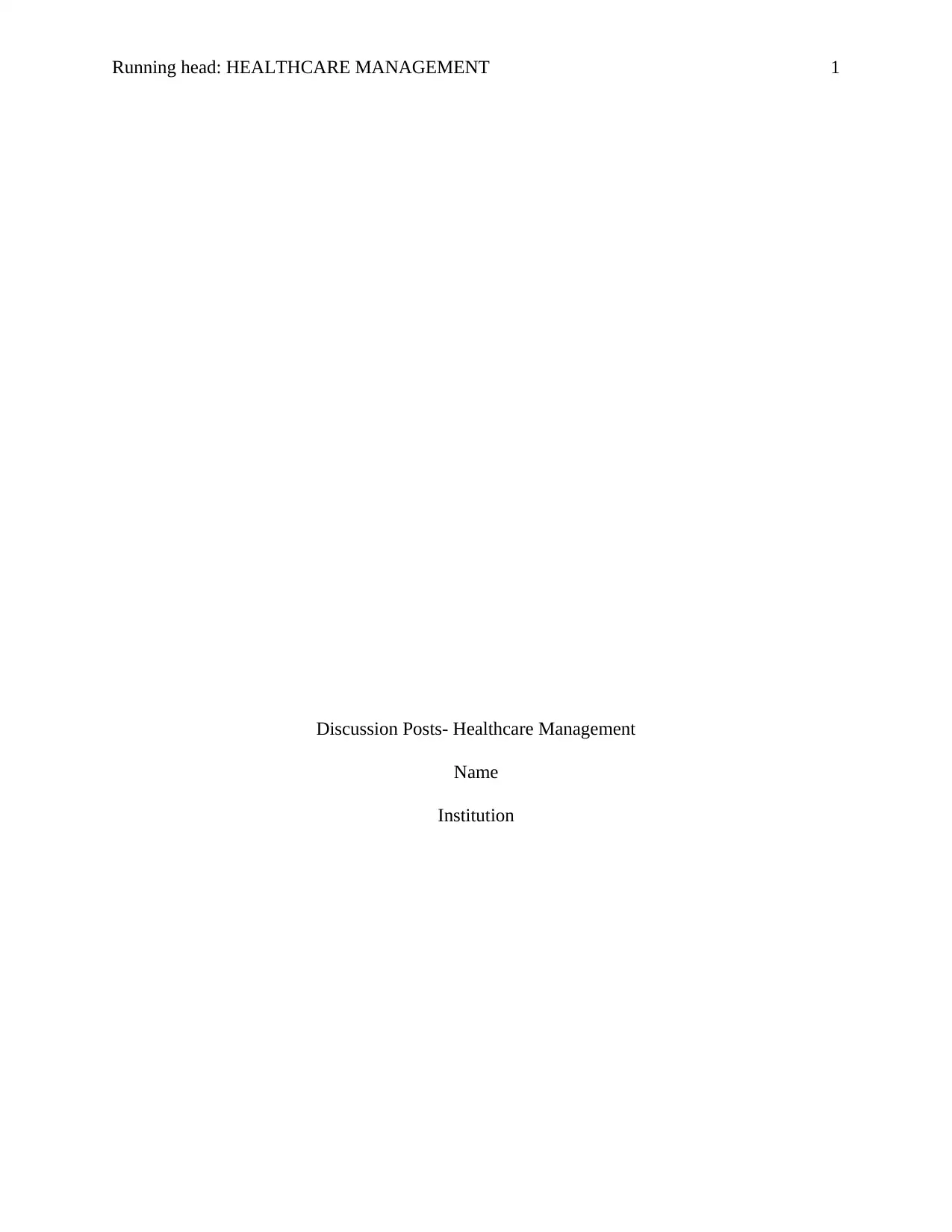
Running head: HEALTHCARE MANAGEMENT 1
Discussion Posts- Healthcare Management
Name
Institution
Discussion Posts- Healthcare Management
Name
Institution
Paraphrase This Document
Need a fresh take? Get an instant paraphrase of this document with our AI Paraphraser
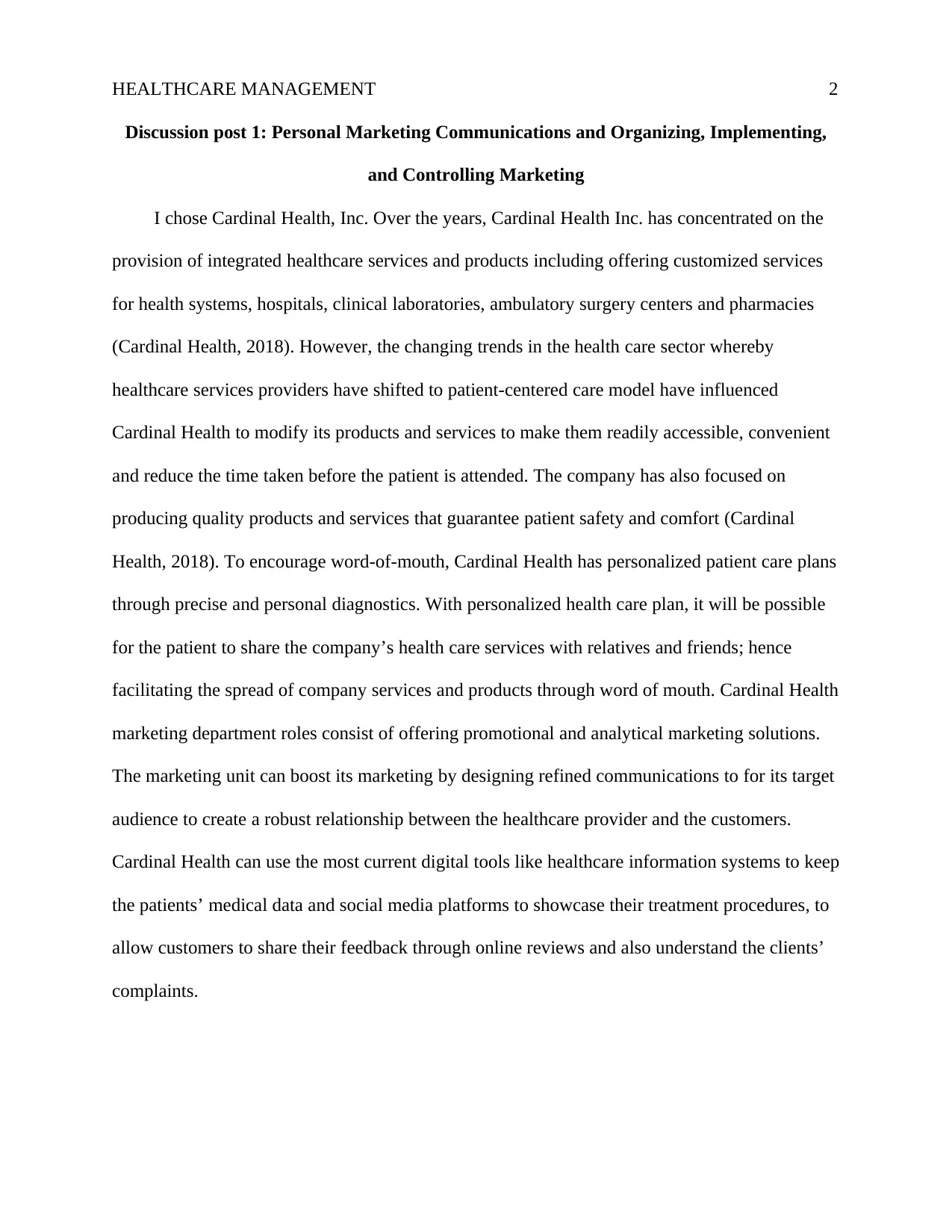
HEALTHCARE MANAGEMENT 2
Discussion post 1: Personal Marketing Communications and Organizing, Implementing,
and Controlling Marketing
I chose Cardinal Health, Inc. Over the years, Cardinal Health Inc. has concentrated on the
provision of integrated healthcare services and products including offering customized services
for health systems, hospitals, clinical laboratories, ambulatory surgery centers and pharmacies
(Cardinal Health, 2018). However, the changing trends in the health care sector whereby
healthcare services providers have shifted to patient-centered care model have influenced
Cardinal Health to modify its products and services to make them readily accessible, convenient
and reduce the time taken before the patient is attended. The company has also focused on
producing quality products and services that guarantee patient safety and comfort (Cardinal
Health, 2018). To encourage word-of-mouth, Cardinal Health has personalized patient care plans
through precise and personal diagnostics. With personalized health care plan, it will be possible
for the patient to share the company’s health care services with relatives and friends; hence
facilitating the spread of company services and products through word of mouth. Cardinal Health
marketing department roles consist of offering promotional and analytical marketing solutions.
The marketing unit can boost its marketing by designing refined communications to for its target
audience to create a robust relationship between the healthcare provider and the customers.
Cardinal Health can use the most current digital tools like healthcare information systems to keep
the patients’ medical data and social media platforms to showcase their treatment procedures, to
allow customers to share their feedback through online reviews and also understand the clients’
complaints.
Discussion post 1: Personal Marketing Communications and Organizing, Implementing,
and Controlling Marketing
I chose Cardinal Health, Inc. Over the years, Cardinal Health Inc. has concentrated on the
provision of integrated healthcare services and products including offering customized services
for health systems, hospitals, clinical laboratories, ambulatory surgery centers and pharmacies
(Cardinal Health, 2018). However, the changing trends in the health care sector whereby
healthcare services providers have shifted to patient-centered care model have influenced
Cardinal Health to modify its products and services to make them readily accessible, convenient
and reduce the time taken before the patient is attended. The company has also focused on
producing quality products and services that guarantee patient safety and comfort (Cardinal
Health, 2018). To encourage word-of-mouth, Cardinal Health has personalized patient care plans
through precise and personal diagnostics. With personalized health care plan, it will be possible
for the patient to share the company’s health care services with relatives and friends; hence
facilitating the spread of company services and products through word of mouth. Cardinal Health
marketing department roles consist of offering promotional and analytical marketing solutions.
The marketing unit can boost its marketing by designing refined communications to for its target
audience to create a robust relationship between the healthcare provider and the customers.
Cardinal Health can use the most current digital tools like healthcare information systems to keep
the patients’ medical data and social media platforms to showcase their treatment procedures, to
allow customers to share their feedback through online reviews and also understand the clients’
complaints.
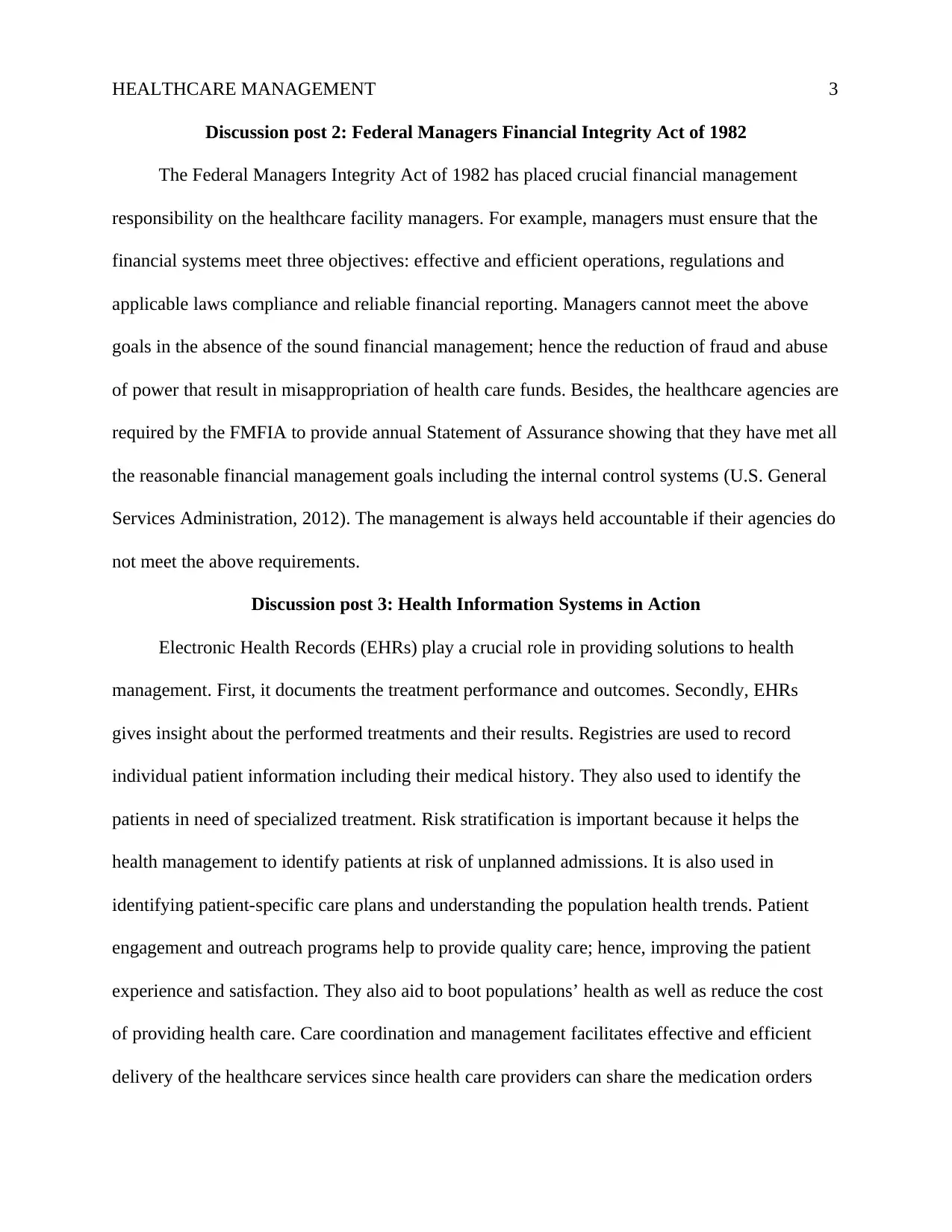
HEALTHCARE MANAGEMENT 3
Discussion post 2: Federal Managers Financial Integrity Act of 1982
The Federal Managers Integrity Act of 1982 has placed crucial financial management
responsibility on the healthcare facility managers. For example, managers must ensure that the
financial systems meet three objectives: effective and efficient operations, regulations and
applicable laws compliance and reliable financial reporting. Managers cannot meet the above
goals in the absence of the sound financial management; hence the reduction of fraud and abuse
of power that result in misappropriation of health care funds. Besides, the healthcare agencies are
required by the FMFIA to provide annual Statement of Assurance showing that they have met all
the reasonable financial management goals including the internal control systems (U.S. General
Services Administration, 2012). The management is always held accountable if their agencies do
not meet the above requirements.
Discussion post 3: Health Information Systems in Action
Electronic Health Records (EHRs) play a crucial role in providing solutions to health
management. First, it documents the treatment performance and outcomes. Secondly, EHRs
gives insight about the performed treatments and their results. Registries are used to record
individual patient information including their medical history. They also used to identify the
patients in need of specialized treatment. Risk stratification is important because it helps the
health management to identify patients at risk of unplanned admissions. It is also used in
identifying patient-specific care plans and understanding the population health trends. Patient
engagement and outreach programs help to provide quality care; hence, improving the patient
experience and satisfaction. They also aid to boot populations’ health as well as reduce the cost
of providing health care. Care coordination and management facilitates effective and efficient
delivery of the healthcare services since health care providers can share the medication orders
Discussion post 2: Federal Managers Financial Integrity Act of 1982
The Federal Managers Integrity Act of 1982 has placed crucial financial management
responsibility on the healthcare facility managers. For example, managers must ensure that the
financial systems meet three objectives: effective and efficient operations, regulations and
applicable laws compliance and reliable financial reporting. Managers cannot meet the above
goals in the absence of the sound financial management; hence the reduction of fraud and abuse
of power that result in misappropriation of health care funds. Besides, the healthcare agencies are
required by the FMFIA to provide annual Statement of Assurance showing that they have met all
the reasonable financial management goals including the internal control systems (U.S. General
Services Administration, 2012). The management is always held accountable if their agencies do
not meet the above requirements.
Discussion post 3: Health Information Systems in Action
Electronic Health Records (EHRs) play a crucial role in providing solutions to health
management. First, it documents the treatment performance and outcomes. Secondly, EHRs
gives insight about the performed treatments and their results. Registries are used to record
individual patient information including their medical history. They also used to identify the
patients in need of specialized treatment. Risk stratification is important because it helps the
health management to identify patients at risk of unplanned admissions. It is also used in
identifying patient-specific care plans and understanding the population health trends. Patient
engagement and outreach programs help to provide quality care; hence, improving the patient
experience and satisfaction. They also aid to boot populations’ health as well as reduce the cost
of providing health care. Care coordination and management facilitates effective and efficient
delivery of the healthcare services since health care providers can share the medication orders
⊘ This is a preview!⊘
Do you want full access?
Subscribe today to unlock all pages.

Trusted by 1+ million students worldwide
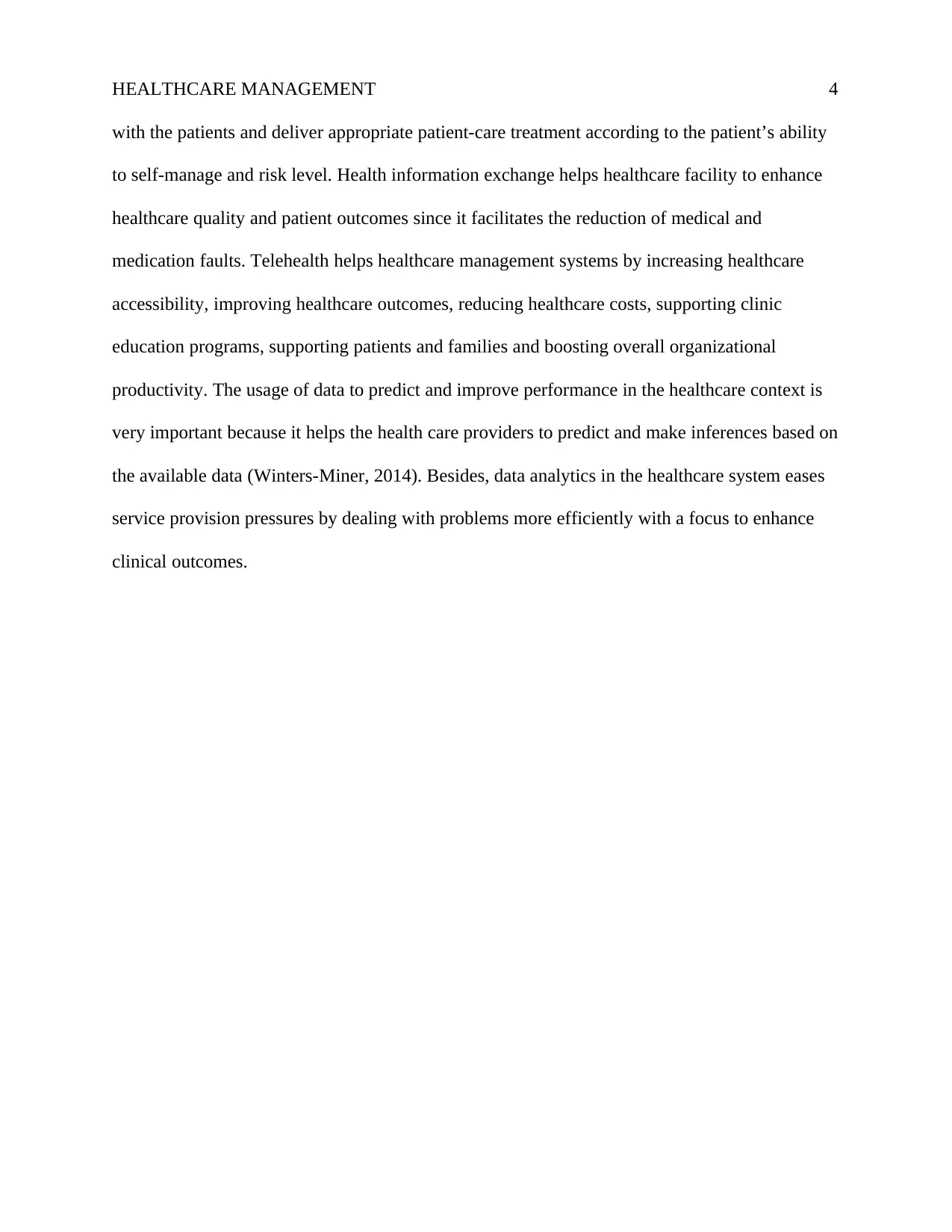
HEALTHCARE MANAGEMENT 4
with the patients and deliver appropriate patient-care treatment according to the patient’s ability
to self-manage and risk level. Health information exchange helps healthcare facility to enhance
healthcare quality and patient outcomes since it facilitates the reduction of medical and
medication faults. Telehealth helps healthcare management systems by increasing healthcare
accessibility, improving healthcare outcomes, reducing healthcare costs, supporting clinic
education programs, supporting patients and families and boosting overall organizational
productivity. The usage of data to predict and improve performance in the healthcare context is
very important because it helps the health care providers to predict and make inferences based on
the available data (Winters-Miner, 2014). Besides, data analytics in the healthcare system eases
service provision pressures by dealing with problems more efficiently with a focus to enhance
clinical outcomes.
with the patients and deliver appropriate patient-care treatment according to the patient’s ability
to self-manage and risk level. Health information exchange helps healthcare facility to enhance
healthcare quality and patient outcomes since it facilitates the reduction of medical and
medication faults. Telehealth helps healthcare management systems by increasing healthcare
accessibility, improving healthcare outcomes, reducing healthcare costs, supporting clinic
education programs, supporting patients and families and boosting overall organizational
productivity. The usage of data to predict and improve performance in the healthcare context is
very important because it helps the health care providers to predict and make inferences based on
the available data (Winters-Miner, 2014). Besides, data analytics in the healthcare system eases
service provision pressures by dealing with problems more efficiently with a focus to enhance
clinical outcomes.
Paraphrase This Document
Need a fresh take? Get an instant paraphrase of this document with our AI Paraphraser
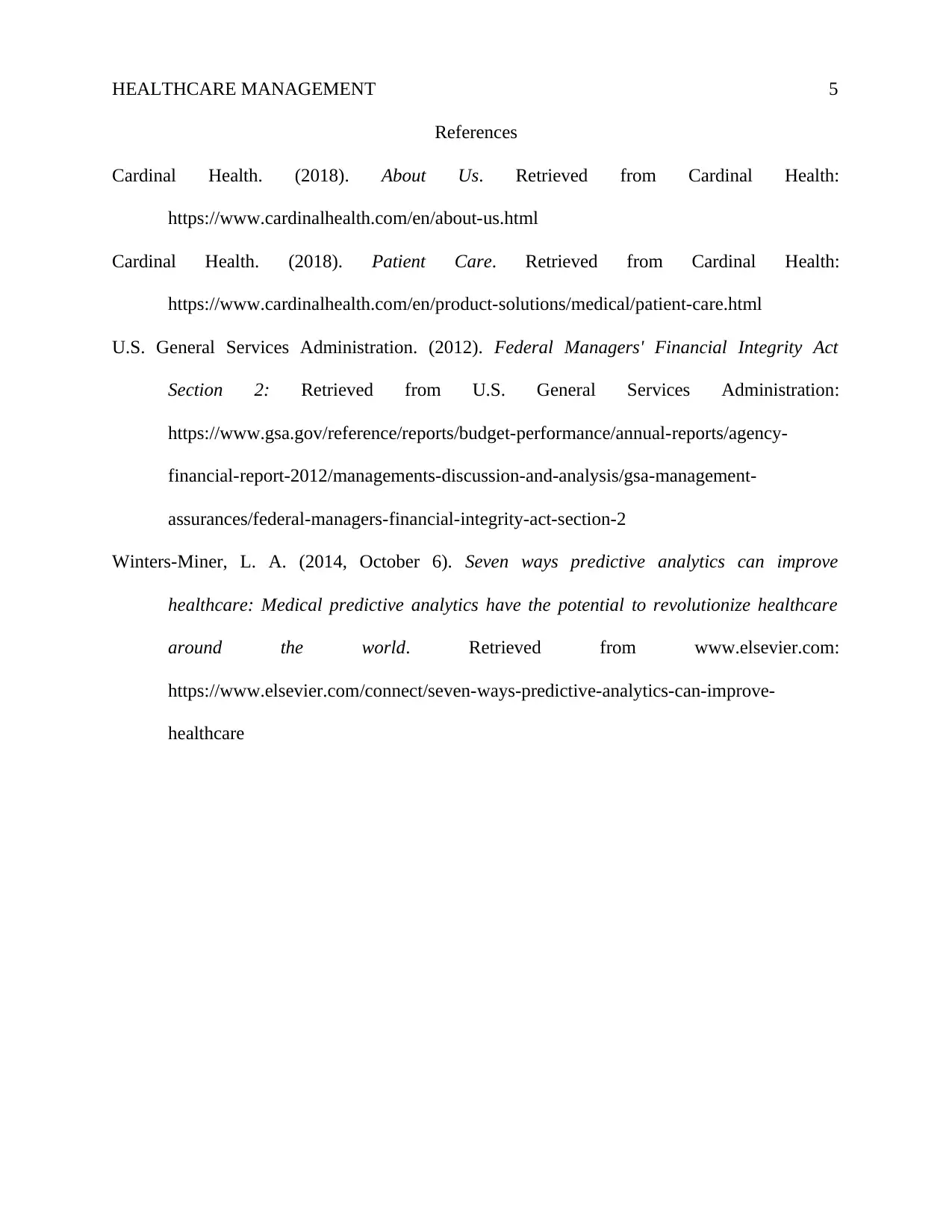
HEALTHCARE MANAGEMENT 5
References
Cardinal Health. (2018). About Us. Retrieved from Cardinal Health:
https://www.cardinalhealth.com/en/about-us.html
Cardinal Health. (2018). Patient Care. Retrieved from Cardinal Health:
https://www.cardinalhealth.com/en/product-solutions/medical/patient-care.html
U.S. General Services Administration. (2012). Federal Managers' Financial Integrity Act
Section 2: Retrieved from U.S. General Services Administration:
https://www.gsa.gov/reference/reports/budget-performance/annual-reports/agency-
financial-report-2012/managements-discussion-and-analysis/gsa-management-
assurances/federal-managers-financial-integrity-act-section-2
Winters-Miner, L. A. (2014, October 6). Seven ways predictive analytics can improve
healthcare: Medical predictive analytics have the potential to revolutionize healthcare
around the world. Retrieved from www.elsevier.com:
https://www.elsevier.com/connect/seven-ways-predictive-analytics-can-improve-
healthcare
References
Cardinal Health. (2018). About Us. Retrieved from Cardinal Health:
https://www.cardinalhealth.com/en/about-us.html
Cardinal Health. (2018). Patient Care. Retrieved from Cardinal Health:
https://www.cardinalhealth.com/en/product-solutions/medical/patient-care.html
U.S. General Services Administration. (2012). Federal Managers' Financial Integrity Act
Section 2: Retrieved from U.S. General Services Administration:
https://www.gsa.gov/reference/reports/budget-performance/annual-reports/agency-
financial-report-2012/managements-discussion-and-analysis/gsa-management-
assurances/federal-managers-financial-integrity-act-section-2
Winters-Miner, L. A. (2014, October 6). Seven ways predictive analytics can improve
healthcare: Medical predictive analytics have the potential to revolutionize healthcare
around the world. Retrieved from www.elsevier.com:
https://www.elsevier.com/connect/seven-ways-predictive-analytics-can-improve-
healthcare
1 out of 5
Related Documents
Your All-in-One AI-Powered Toolkit for Academic Success.
+13062052269
info@desklib.com
Available 24*7 on WhatsApp / Email
![[object Object]](/_next/static/media/star-bottom.7253800d.svg)
Unlock your academic potential
Copyright © 2020–2025 A2Z Services. All Rights Reserved. Developed and managed by ZUCOL.




